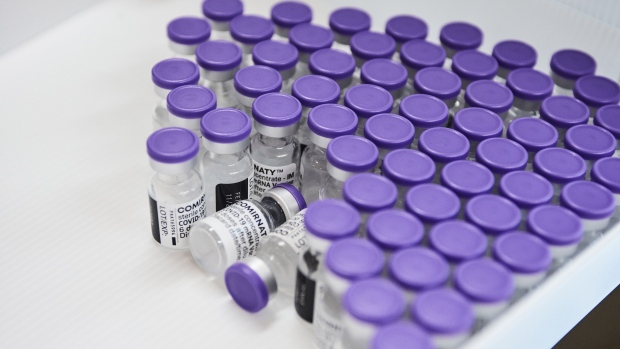May 2, 2023
Pfizer Beats Estimates as Covid Shot, Drug Sales Outperform
, Bloomberg News

(Bloomberg) -- Pfizer Inc.’s first-quarter profit and revenue outpaced analysts’ expectations on surprising resilience in pandemic products that the company doesn’t see lasting throughout the year.
Adjusted first-quarter earnings were $1.23 a share, Pfizer said Tuesday in a statement, exceeding analysts’ expectation of 97 cents, and revenue of $18.3 billion also handily beat Wall Street’s expectations. The company left untouched its full year earnings guidance, and the shares rose as much as 2.3%, the most intraday in about a month, as markets opened in the US.
Pfizer has struggled with a steep dropoff in demand for its Covid-19 products that has made its stock among the worst-performing in big pharma this year. The New York-based drugmaker has pledged to step up product launches to help fill the gap and announced the $43 billion planned acquisition of cancer-drug biotech Seagen Inc. earlier this year, giving investors more assurance that it’s seeking new avenues for growth.
Pfizer’s Covid vaccine Comirnaty and Paxlovid antiviral transformed the company, contributing more than half its $100 billion in sales last year. First-quarter revenue for the shot fell 77% to $3.1 billion, still more than the $2.6 billion analysts expected. Paxlovid saw quarterly purchases at $4.1 billion, well above estimates for $2.7 billion.
“This is not a great beat,” Bloomberg Intelligence analyst Sam Fazeli said in an email. “They didn’t change guidance - it’s just timing and shows how tough it is to forecast Covid-19 revenues in 2023.”
The US registered 88,330 Covid infections and 1,052 deaths in the final week of April as cases have continued to fall, according to the US Centers for Disease Control and Prevention.
Pfizer’s core business disappointed, Wells Fargo analyst Mohit Bansal wrote in a research note. Blood-thinner Eliquis reported $1.87 billion in sales, and breast cancer drug Ibrance brought $1.14 billion, both narrowly missing estimates. The company’s expanding group of pneumoccocal vaccines under the Prevnar brand clocked $1.59 billion in sales, slightly beating expectations.
EU Negotiations
The opening quarter was likely the strongest for Paxlovid, “due to China demand and the $2 billion US contract appearing to be mostly delivered in the first quarter,” Bansal said.
The unchanged annual earnings guidance is positive, Bansal said, but contract negotiations with the European Union on vaccine purchases may still hurt its annual outlook. Poland, leading the EU negotiation, pressured Pfizer to scale back its supply contract in a letter to shareholders Tuesday.
Read More: Poland Takes Fight Over Covid Vaccine to Pfizer Shareholders
The drugmaker also reported top-line results from a final-stage study evaluating the safety and immunogenicity of a bivalent vaccine for both respiratory syncytial virus, or RSV, and flu in adults 65 and older, saying it met the primary endpoint demonstrating non-inferiority for all four flu strains and two RSV groups. The results show that the RSV vaccine, if approved, can be administered with the flu shot, Pfizer said.
Pfizer is getting closer to launching a vaccine for RSV in adults after receiving support from a regulatory panel in March, and has said it is already manufacturing doses that will be ready in the third quarter.
The company expects the Seagen deal to close late this year or early 2024 after antitrust regulators will likely closely examine the purchase.
(Adds share move in second paragraph.)
©2023 Bloomberg L.P.


